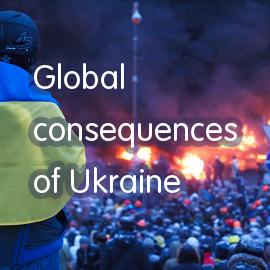The Global Consequences of Ukraine
ECFR launches an ambitious new strand of work on the global consequences of the Ukraine crisis
“The world will never be the same again”, said European Council President Herman van Rompuy at the Brussels Forum last month. His words speak to a geopolitical awakening in the heart of the European Union and sum up the bewilderment of many European leaders who thought they were at the “end of history” and that territorial aggression in Europe was obsolete. These leaders now find themselves dealing with revisionist powers rather than “responsible stakeholders”. They find themselves between Scylla and Charybdis: on the one hand the danger of inaction in the face of territorial aggression in their own neighbourhood; on the other hand the danger that by casting Russia out of the international institutions they have spent 20 years trying to bind it into, they will help dismantle an international system on which Europe’s prosperity depends.
Over the next few weeks ECFR will be organising an ambitious new strand of work on the global consequences of the Ukraine crisis. We will publish a series of short, sharp original publications, longer policy briefs and reports, and a series of public and private events and podcasts in the seven capitals where ECFR has offices. Our goal is to deepen and broaden the European conversation by bringing in fresh insights from around Europe as well as Russia and the post-soviet space. Our programme of work will be organised around four main dimensions:
The most obvious effect is the European neighbourhood, where Putin is challenging the post-Cold War European security order. We have spent time in Russia talking to operatives close the the Kremlin, intellectuals, diplomats and dissidents trying to understand how Russian foreign policy is evolving. This is coupled with an investigation into the political dynamics of the Eastern neighbourhood.
The second level that European leaders need to think about is about how Russia’s actions may affect Europe’s interests in other regions – in particular the Middle East and Asia. In both of these regions there is a danger that other countries from China to Saudi Arabia will embrace the precedent of using force to protect their peoples. At the same time, there is a danger that, in response, Western allies will be driven to re-arm and even acquire nuclear weapons. Furthermore, if there is a further escalation with Russia, it might be tempted to act as a spoiler on key issues such as Syria, Iran and the Middle East peace process.
The third set of challenges are to do with the danger of Russian actions – and Western responses – leading to the unwinding of the current international order itself. For the last few decades, Western powers have benefited from an international architecture they designed and policed. Although rising powers such as Brazil, China and India have not overturned these post–war institutions, they are uncomfortable with the way the West has used global institutions to pursue its own interests and are increasingly “routing around” global institutions by creating bilateral arrangements while caucusing within them to hollow out the liberal bias of their rules and regulations. If the West now tries to use these institutions to act not just against Iran and North Korea but against Russia – a permanent member of the United Nations Security Council – it may find that it encourages revisionism rather than deterring it.
Finally, responding to Russian revisionism is a major challenge for EU unity – and the nature of the EU as a security community. Beyond the differences between member states’ economic and security exposure, there have been persistent divisions between those who thought that the best approach to Russia was to engage with it those who thought that the Kremlin only respects those who stand up to it. Though those differences between member states seemed to have narrowed in the last five years, there is a danger that they will now widen again as Europeans face tough choices about how to deal with an aggressive, revisionist Russia. The EU’s ability to deal with the challenges outlined in this brief will depend to a large extent on the extent to which it manages to unite around shared global imperatives rather than being divided by the asymmetric impact of Russia on the EU.
The European Council on Foreign Relations does not take collective positions. ECFR publications only represent the views of their individual authors.




